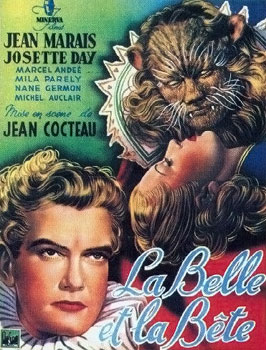
(La Belle et la Bete Poster, 1946)
La Belle et la Bete is a 1946 romantic fantasy film directed by French filmmaker Jean Cocteau. It is an adaptation of the 1757 story Beauty and the Beast.
The theme of love is prominent in this film, its found in every crack and crevice. There's the selfish love Avenant feels for Belle, the negative love of the sisters, the brotherly love of Ludovic, the family love of her father and of course the sexual love of the Beast and Belle.
"Love is portrayed not only in a romantic way between the Beast and Belle but also in Belle’s undying love for her father. She grows physically ill just because she can’t bear to be away from him any longer. It gets so bad to the point that the Beast actually allows her to leave for a week. One can tell her devotion to her father is strong because she would rather wait on her horrible sisters and work and clean rather than have to leave her father’s side." - (Sites.psu.edu, 2017)
(La Belle et la Bete, 1946)
People choose to focus on the love between the Beast and Belle, but forget about all the other kinds of love in this film. As the author of the quote above said, Belle loves her father so much. She doesn't want to leave her father's side and yet she would do anything for him, even die in his place at the hands of the Beast. However with all the positive love of this film, there is one question, should we love those who threaten us, as Belle has. It's obvious she falls in love with the Beast by the end of the film. And yet he threatened to kill her father, begs her to marry him, even blackmails her when he tells her he will die of grief if she doesn't come home.
"What it all means I’m less than certain. Are we supposed to love everyone, even our kidnappers? If a man came into a home and took away someone’s daughter and then attempted to woe her with his ... er ... civilized personality, would we condone his actions? Probably not." - (Ames, 2011)


(La Belle et la Bete, 1946)
I agree with Ames. Certainly, in the context of this film being fantasy, things like this wouldn't happen, but if anything like this were to happen, whether now or when this film was set, people would not take kindly to it. It's borderline domestic Violence and extremely toxic behavior.
"She acknowledges the persistent love of La Bête, but she herself loves the nocturnal prince. To him, she explains her dilemma, and he replies: “Love the one who loves you, don’t be fooled by appearances, and free me from my prison”" - (Hamburger, 2015)
Belle, however, does know about the Beast's persistent affection with her and uses it to her advantage while she stays in his castle. She does come to love the Beast but still leads him on, not wanting to belong to anyone. Even at the end when he looks like Avenant, she admits she wants the old Beast back, not wanting to admit to wanting him properly.
Belle, however, does know about the Beast's persistent affection with her and uses it to her advantage while she stays in his castle. She does come to love the Beast but still leads him on, not wanting to belong to anyone. Even at the end when he looks like Avenant, she admits she wants the old Beast back, not wanting to admit to wanting him properly.
This film, while beautiful visually, touches on serious subjects, and while simple, makes things more complicated in the love triangle department than needs be.
Bibliography:
Images:
La Belle et la Bete Poster. (1946). [image] Available at: https://upload.wikimedia.org/wikipedia/en/a/a4/La_Belle_et_la_B%C3%AAte_film.jpg [Accessed 2 Nov. 2017].
La Belle et la Bete. (1946). [DVD] Directed by J. Cocteau. France: DisCina.
Quotes:
Sites.psu.edu. (2017). Theme and Form | La Belle et la Bête. [online] Available at: http://sites.psu.edu/fr138newton/theme-and-form/ [Accessed 2 Nov. 2017].
Ames, J. (2011). 'Beauty and the Beast (La Belle et la Bete)': At Odds with Itself. [online] PopMatters. Available at: https://www.popmatters.com/145938-beauty-and-the-beast-la-belle-et-la-bete-2495973330.html [Accessed 2 Nov. 2017].
Hamburger, A. (2015). Women and Images of Men in Cinema. Karnac Books, p.54.

Excellent Annie :) Did that help, just focussing on one ascpect?
ReplyDeleteMy only comment would be, to be careful that you don't lapse into using the 1st person, as you have done here - 'I agree with Ames.' Have another look at Phil's academic writing tips for advice on how to avoid this, here - http://ucarochester-cgartsandanimation.blogspot.co.uk/2017/09/fao-caa-yr-1-invisible-cities-2017.html
Looking forward to the next one!
Ah shoot that must have slipped past when i re read it. I'll be sure not to do that next time!
DeleteHey Annie - there's a noticeably mature voice here - a writerly style that is confident and distinctive. I'm encouraged - you should be too.
ReplyDelete